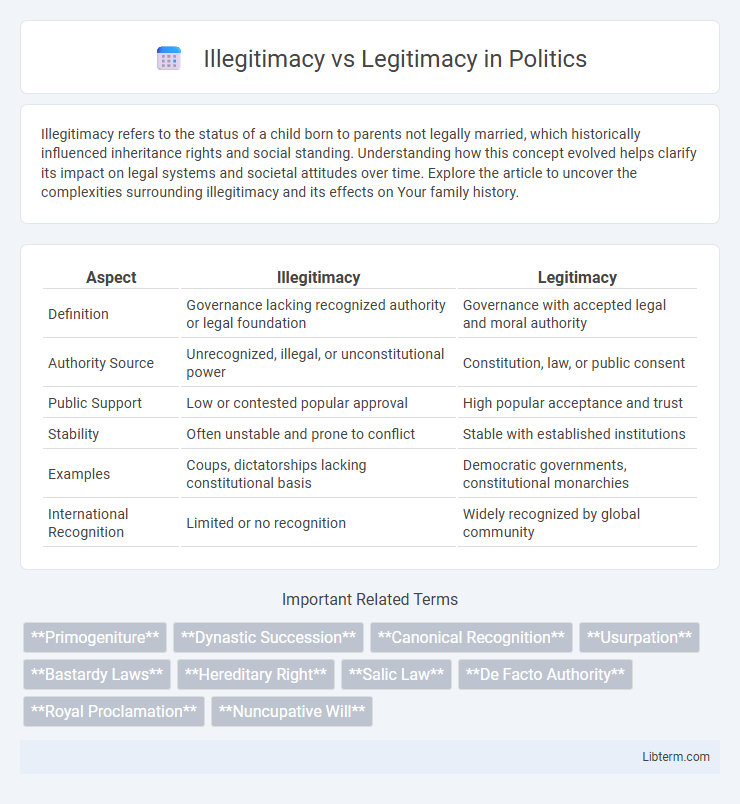Illegitimacy refers to the status of a child born to parents not legally married, which historically influenced inheritance rights and social standing. Understanding how this concept evolved helps clarify its impact on legal systems and societal attitudes over time. Explore the article to uncover the complexities surrounding illegitimacy and its effects on Your family history.
Table of Comparison
| Aspect | Illegitimacy | Legitimacy |
|---|---|---|
| Definition | Governance lacking recognized authority or legal foundation | Governance with accepted legal and moral authority |
| Authority Source | Unrecognized, illegal, or unconstitutional power | Constitution, law, or public consent |
| Public Support | Low or contested popular approval | High popular acceptance and trust |
| Stability | Often unstable and prone to conflict | Stable with established institutions |
| Examples | Coups, dictatorships lacking constitutional basis | Democratic governments, constitutional monarchies |
| International Recognition | Limited or no recognition | Widely recognized by global community |
Understanding Illegitimacy and Legitimacy
Illegitimacy refers to the status of a child born outside of legal marriage, often impacting inheritance rights and social recognition, while legitimacy denotes birth within a lawful marriage, ensuring full legal and social acceptance. Understanding legitimacy involves recognizing its role in establishing family lineage, legal protection, and societal status, whereas illegitimacy historically carried stigma and legal disadvantages. Contemporary legal systems increasingly prioritize the rights and welfare of children regardless of birth status, reducing discrimination based on legitimacy.
Historical Perspectives on Legitimacy
Historical perspectives on legitimacy emphasize the divine right of kings, where monarchs were believed to rule by God's will, establishing a foundation for political authority. The evolution of social contract theory during the Enlightenment shifted legitimacy toward the consent of the governed, challenging traditional hereditary rule. These frameworks have profoundly influenced modern notions of state sovereignty and political legitimacy in contemporary governance.
Legal Definitions and Frameworks
Illegitimacy and legitimacy in legal contexts refer to the status of a child's birth in relation to recognized parental rights and societal norms, governed by specific statutory frameworks. Legitimacy is typically established through marriage or legal acknowledgment by parents, granting the child full inheritance rights and legal recognition, while illegitimacy historically implied lack of these rights, though modern laws in many jurisdictions have abolished such distinctions to ensure equal protection. Legal definitions vary globally but consistently revolve around parental relationships, registration, and the state's recognition, influencing family law, inheritance, and identity rights.
Social Implications of Illegitimacy
Illegitimacy carries significant social implications, often leading to stigmatization and reduced access to legal rights such as inheritance and parental recognition. Children born out of wedlock historically faced social exclusion and discrimination, impacting their psychological well-being and social mobility. Contemporary shifts in family law and societal attitudes are gradually mitigating these disparities, promoting equal treatment regardless of legitimacy status.
Legitimacy in Governance and Authority
Legitimacy in governance and authority is the recognized right of a government or leader to exercise power, derived from legal frameworks, social contracts, and popular consent. It ensures political stability, citizen compliance, and effective policy implementation by establishing trust and acceptance among the governed. Governments with legitimacy also maintain authority through transparent institutions, rule of law, and accountability mechanisms that reinforce their lawful sovereignty.
Cultural Attitudes Toward Illegitimacy
Cultural attitudes toward illegitimacy have historically influenced social status, legal rights, and family dynamics, often stigmatizing children born outside of marriage. In many societies, illegitimacy has been associated with social exclusion and limited inheritance rights, whereas legitimacy confers recognized lineage and social acceptance. Contemporary shifts toward inclusivity have challenged traditional norms, promoting equal treatment regardless of birth circumstances.
The Role of Legitimacy in Relationships
Legitimacy in relationships establishes social recognition, legal rights, and emotional security, which contribute to stability and trust between partners. Illegitimacy often results in social stigma and limited access to legal protections, affecting familial bonds and individual well-being. Understanding the role of legitimacy highlights the importance of societal acceptance and legal frameworks in fostering healthy, enduring relationships.
Consequences of Illegitimacy in Society
Illegitimacy in society often leads to social stigma, limiting access to legal rights, inheritance, and social services for affected individuals. Children born out of wedlock may experience discrimination in education, healthcare, and community acceptance, impacting their overall development and economic opportunities. These consequences reinforce social inequalities and perpetuate cycles of marginalization and poverty within affected populations.
Pathways to Legitimacy
Pathways to legitimacy often involve transparent governance, adherence to legal frameworks, and consistent ethical practices that align with societal norms and expectations. Entities achieve legitimacy by fostering trust through accountability, engaging stakeholders meaningfully, and demonstrating long-term commitment to lawful and moral standards. These processes create a foundation where legitimacy replaces illegitimacy, resulting in stronger institutional credibility and social acceptance.
Comparing Illegitimacy and Legitimacy Across Contexts
Illegitimacy and legitimacy differ fundamentally in social, legal, and political contexts, with legitimacy typically grounded in recognized authority, adherence to laws, and societal acceptance, whereas illegitimacy often denotes the absence of lawful recognition or acceptance. In legal terms, legitimacy may confer rights and privileges, such as inheritance rights or political power, while illegitimacy can result in exclusion or diminished status. Across cultural contexts, the perception of legitimacy can vary significantly, influenced by historical traditions, legal frameworks, and social norms that define what is deemed acceptable or recognized authority.
Illegitimacy Infographic

 libterm.com
libterm.com